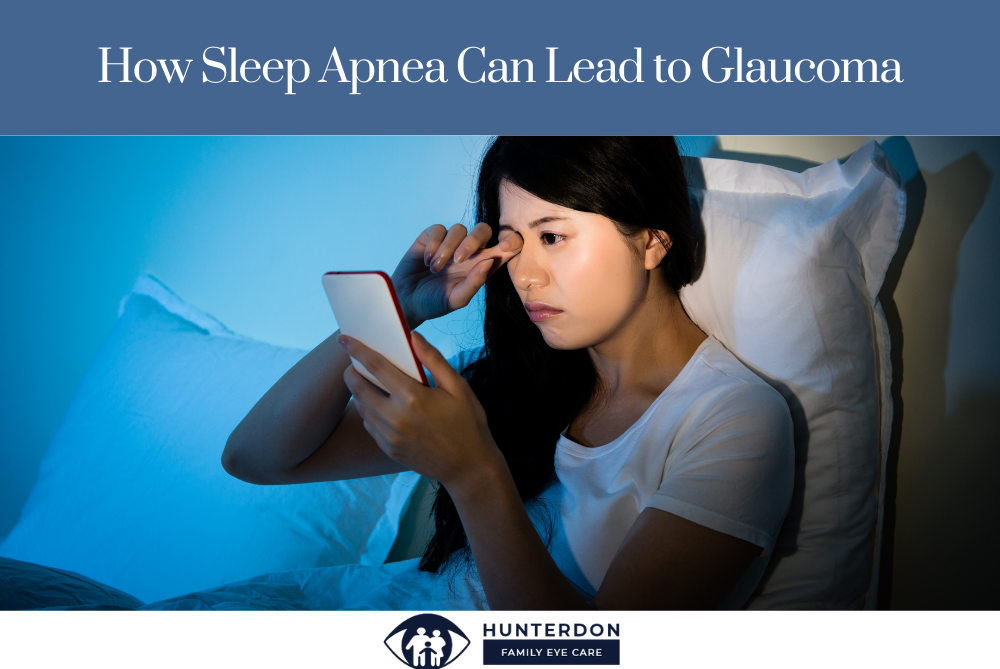At Hunterdon Family Eye Care, we emphasize the importance of holistic eye health, recognizing how interconnected our overall health is with the condition of our eyes. One such critical connection is between sleep apnea and glaucoma. Sleep apnea is a condition characterized by interrupted breathing during sleep, which not only affects your overall health but also significantly impacts your eye health. In this blog, we explore how sleep apnea can lead to glaucoma and discuss the importance of early diagnosis and management.
What is Sleep Apnea?
Sleep apnea is a common sleep disorder characterized by repeated interruptions in breathing while asleep. These pauses, known as apneas, can last from a few seconds to over a minute and may occur multiple times throughout the night. There are primarily two types:
- Obstructive Sleep Apnea (OSA): The most common type, caused by a blockage in the airway, typically from soft tissue collapse.
- Central Sleep Apnea: Occurs when the brain fails to signal the muscles to breathe due to instability in the respiratory control center.
How Sleep Apnea Contributes to Glaucoma
Glaucoma is a serious eye condition characterized by increased intraocular pressure (IOP) that can damage the optic nerve, leading to irreversible vision loss. Research has shown a strong correlation between sleep apnea and glaucoma. Here’s how the two conditions are connected:
1. Reduced Oxygen Levels
Sleep apnea significantly reduces blood oxygen saturation levels due to repeated breathing interruptions. This hypoxia (low oxygen levels) can adversely affect the optic nerve, potentially causing nerve damage and increasing the risk of glaucoma.
2. Increased Intraocular Pressure
Frequent episodes of apnea and the subsequent rapid fluctuations in oxygen levels can alter normal intraocular pressure regulation. Over time, these fluctuations may result in chronically elevated IOP, causing optic nerve damage typical of glaucoma.
3. Disrupted Blood Flow
Sleep apnea can lead to vascular disruptions, limiting blood flow to essential eye tissues, especially the optic nerve. This diminished blood supply may compromise optic nerve health, accelerating the development of glaucoma.
Identifying Symptoms and Risk Factors
Early identification is crucial to managing both sleep apnea and glaucoma effectively. Common symptoms include:
- Loud snoring
- Gasping or choking during sleep
- Excessive daytime fatigue
- Morning headaches
- Blurry vision, particularly upon awakening
Risk factors include:
- Obesity
- Family history of glaucoma or sleep apnea
- Advanced age
- High blood pressure
The Importance of Comprehensive Eye Exams
At Hunterdon Family Eye Care, we stress the importance of regular comprehensive eye examinations. Early detection of glaucoma linked to sleep apnea can prevent significant vision loss. Our experienced optometrists use state-of-the-art diagnostic tools to assess eye health thoroughly, ensuring early intervention and appropriate treatment strategies.
Treatments and Management
Managing sleep apnea effectively reduces the risk of glaucoma. Treatments include:
- Continuous Positive Airway Pressure (CPAP) therapy
- Lifestyle changes, such as weight loss and smoking cessation
- Eye medications or surgery to control intraocular pressure
Comprehensive Q&A Section
Q: Can treating sleep apnea reverse glaucoma damage?
A: While treating sleep apnea cannot reverse existing glaucoma damage, it can significantly reduce the progression by stabilizing intraocular pressure and improving blood oxygenation.
Q: Is glaucoma always associated with high eye pressure?
A: No. Normal-tension glaucoma occurs without elevated IOP. Sleep apnea-related vascular issues can contribute significantly to this type of glaucoma.
Q: How often should I get checked for glaucoma if I have sleep apnea?
A: We recommend annual comprehensive eye exams for patients with sleep apnea, especially if additional glaucoma risk factors exist.
Q: What are early signs of glaucoma I should watch for?
A: Early glaucoma often presents no symptoms. Regular eye examinations are essential for early detection. Late symptoms may include peripheral vision loss or tunnel vision.
Q: Is glaucoma preventable if I have sleep apnea?
A: Early management of sleep apnea can significantly reduce your risk of developing glaucoma, but routine eye checkups remain essential for monitoring.
Schedule Your Eye Exam Today
Your eye health is intricately connected to your overall well-being. If you or a loved one experiences sleep apnea, scheduling regular eye exams at Hunterdon Family Eye Care can help preserve vision and ensure lasting ocular health.
Contact Us
Hunterdon Family Eye Care
Beaver Brook Concourse
1465 Route 31 South Ste. 22 Top Floor
Annandale, NJ 08801
Phone: (908) 730-6774
Text Us: 908-730-6774
Website: hunterdonfamilyeye.com
Take proactive steps toward better eye health today—reach out and schedule your comprehensive exam with Hunterdon Family Eye Care.

